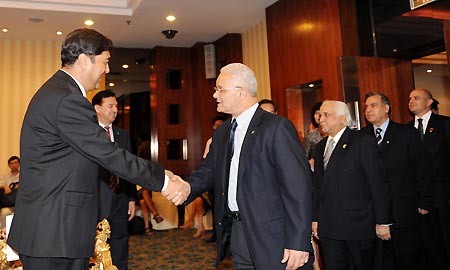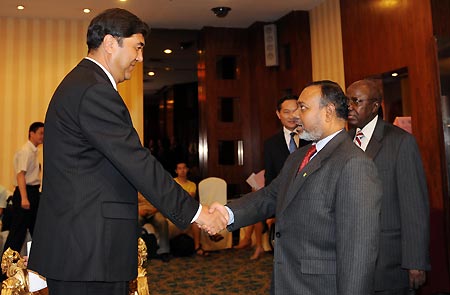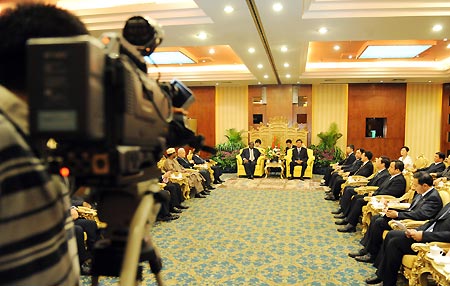Diplomatic envoys from 26 countries and regions in China began a five-day visit to northwestern Xinjiang Uygur Autonomous Region Monday, about a month after the deadly riot in the regional capital of Urumqi.
 |
|
Nur Bekri (1st L), chairman of Xinjiang Uygur Autonomous Region government, shakes hands with Egyptian Ambassador to China Mahmoud Allam in Urumqi, northwest China's Xinjiang Uygur Autonomous Region, on Aug. 10, 2009. Diplomatic envoys from 26 countries and regions in China began a five-day visit to Xinjiang Uygur Autonomous Region Monday, about a month after the deadly riot in the regional capital of Urumqi. At the invitation of the autonomous regional government, they are expected to acquire a better understanding of Xinjiang's development over the past several decades in various respects, including its politics, economy, ethnic and religious policies, preservation of cultural relics and the livelihood of local residents. [Xinhua] |
At the invitation of the autonomous regional government, they are expected to -- through the visit -- acquire a better understanding of Xinjiang's development over the past several decades in various respects, including its politics, economy, ethnic and religious policies, preservation of cultural relics and the livelihood of local residents.
The diplomatic envoys came from Kuwait, Egypt, Saudi Arabia, Pakistan, Syria, Turkey, Afghanistan, Sweden, Australia, the United States and other countries and regions.
"This visit gives us an opportunity to express our support and goodwill to Xinjiang people after the incident and also our expression over Xinjiang's handling of the incident," said Nolama Ta Ama, ambassador of Togo, during a meeting with Nur Berkri, chairman of the Xinjiang autonomous regional government.
 |
|
Nur Bekri (L), chairman of Xinjiang Uygur Autonomous Region government, shakes hands with Bangladeshi Ambassador to China Munshi Faiz Ahmad in Urumqi, northwest China's Xinjiang Uygur Autonomous Region, on Aug. 10, 2009.[Xinhua] |
The Chinese central government and the local government of Xinjiang exercised great restraint during the incident and took effective measures to stop the violence, said Ama, also head of the diplomatic delegation.
He said that violence can only escalate conflicts but cannot solve any problem.
"No government in the world will tolerate the 'three evil forces' and the adherence to 'one China' policy is in the interests of all nations," he said.
"We hope we can learn more about the truth of the incident through the visit," he added.
 |
|
Nur Bekri, chairman of Xinjiang Uygur Autonomous Region government, holds a meeting with diplomatic envoys in Urumqi, northwest China's Xinjiang Uygur Autonomous Region, on Aug. 10, 2009.[Xinhua] |
Nur Berkri briefed the guests about the development of Xinjiang over the past several decades and stressed that the region's rapid development came from the great support of the central government.
He said that the July 5 riot, which left 197 people dead and more than 1,600 others injured, involved very few violent rioters and they cannot represent the Xinjiang people and the Muslims.
"Not a single person in the religious circle participated in the violence," he said. "Violence is not allowed in any sovereignty and law-ruled nation."
(Xinhua News Agency August 11, 2009)